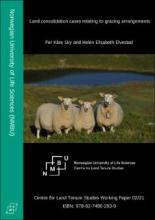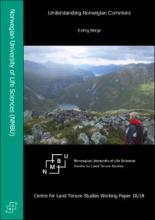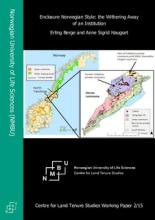Land Library
Welcome to the Land Portal Library. Explore our vast collection of open-access resources (over 74,000) including reports, journal articles, research papers, peer-reviewed publications, legal documents, videos and much more.
/ library resources
Showing items 1 through 9 of 9.Land consolidation courts deal with cases where the relationship between holders of grazing rights needs be regulated, but also where the rights holders are competing with other potential land uses, such as building holiday cabins, forestry, hunting, etc.
In most countries, land consolidation was first introduced in rural areas, with legislation suitable for urban areas being drafted at a later date. This is also true of Norway. The first evidence of urban competency in the legislation is found in the Land Consolidation Act from 1950.
The paper discusses the link between commons as they might have been used in
prehistoric Norway and the rules concerning the exploitation of the commons as
found in the oldest known legislation for regions of Norway, Gulating Law and
Continued high population growth in already densely populated rural areas in parts of Sub-Saharan Africa makes it harder for youth to choose agriculture as their main source of income. We investigate whether near landless youth can still access rented land as a complementary source of income.
The paper reviews the development of the legal status of Norwegian commons from the first known legislation on commons. The development can be divided into 5 periods.
The Land Consolidation Act has recently been revised. The changes came
into force on 1 July 2006 and 1 January 2007. The main changes in the Act are that
the land consolidation court now has formal jurisdiction to handle land consolidation
The paper is part of a joint presentation with Marius Grønning at the 5th International and Interdisciplinary Symposium of the European Academy of Land Use and Development (EALD) held in Oslo 3-5 September 2015.
Paper presented at a Workshop at Universidad Publica de Navarra (Navarre Public University), Pamplona-Iruña (Spain), November 5-7, 2009.
More than 200 years after the King sold one of the “King’s commons” of Follafoss (located inthe current Verran municipality) to urban timber merchants, local people in some ways still behave as if the area is a kind of commons.









